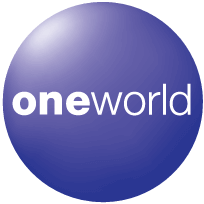Careers & Reskilling
Basic Concept
The work roles of our employees are changing with the optimization of human resource portfolios due to the revisions in business structures and the rapid transitions in the social environment. To respond to these changes, we support career development in job autonomy and reskilling. We support our employees by implementing a job autonomous career development system, such as a human resource system for employees who want to nominate themselves to the department they wish to work in and a system where the employees can use their skills and abilities in an in-house second job system, or providing DX education and reskilling for a second career for our employees to shape their own careers responsibly.
Developing Autonomous Career Design
In order to encourage employees to develop their own careers, we have created opportunities for employees to think about their careers by disseminating information through the CAREER Page on the company intranet, holding the JAL CAREER TALK LIVE where employees active in the JAL Group discuss their careers, and introducing career development training. We also introduced a career consulting interview where employees can discuss career development with a nationally qualified internal career consultant.
We will continue to create an environment where employees can form their own careers and aim to improve employee engagement.
JAL Group Basic Education and Training Program
The JAL Group focusing in nurturing leaders and professionals in safety and service areas, it has established a common basic education and training program in FY2012 and has conducted education and training based on this program.In addition to grade-based training, it has expanded cross-organizational programs such as management skills enhancement training to polish business management skills and invitational challenge training.
Grade-based Training
The JAL Group conducts training for all new JAL Group staff in spring and autumn, new managerial staff, and Area managers as a venue to acquire knowledge and deeply understand the role required in each Grade. In addition to this, each group companies conduct training to following each career path.
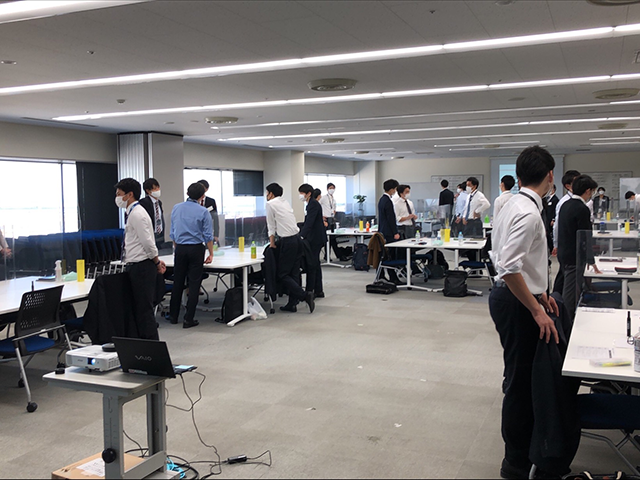
Career-Training
To promote active participation of each employees irrespective of age,the JAL Group conduct Career-Training for employees of all ages. Employees are asked to look back on their career and to build their future career.
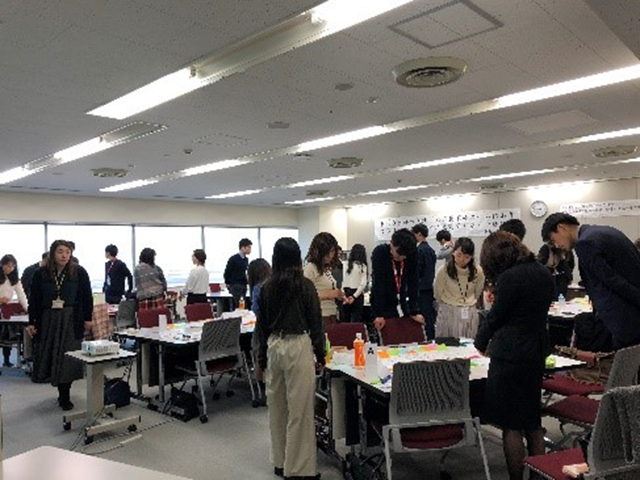
Workplace Improvement Advance Program
With the aim of developing future candidates for management positions, we provide training for employees who have been employed for four years to learn problem-solving techniques and logical thinking. After the training, they work on improving workplace operations for six months. The results are then presented at a presentation session to share the results of work improvements at each workplace.
- As a result of this training, the passenger sales, airport, cargo, and maintenance departments to which the participants belong are expected to generate significant business benefits.
- By completing the improvement measures planned by the participants, the estimated medium to long-term profit effect in the business is as high as 6.99 billion yen approximately.
- Participants in this training are 0.35% of all employees.
- In fiscal 2023, there were 145 employees in their 4th year of employment, and 127 participants. Percentage of eligible employees participating is 87.6%.
Training for polishing Business management skills
We provide opportunities to learn business skills such as logical thinking, problem-solving, and time management, which are necessary for business execution.
In addition to general business skills, we also focus on airline business training and Diversity, Equity and Inclusion (DEI) training specific to the airline industry.
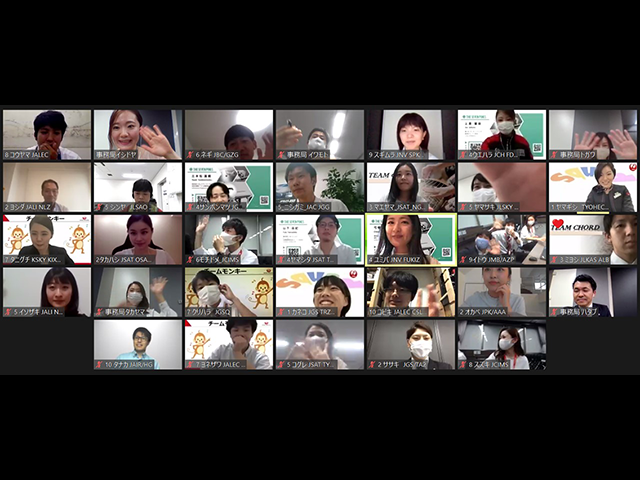
Activity-based Training
JAL Group aim to draw initiatives from every employee by conducting Activity-based training. For example, through Communication Leader Meeting (CLM), rather than merely providing suggestions, each member works in the center of the vortex to consider measures and lead example to solve workplace problems and to common issues within the JAL Group.
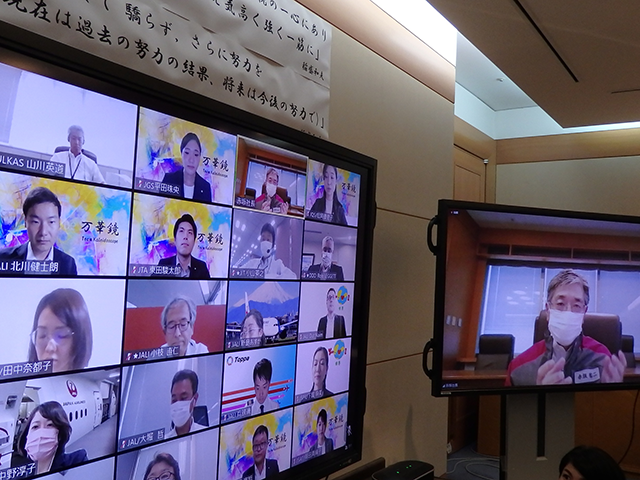
Group-management Training
JAL Group provide a common program for all Group companies in which candidates for leadership roles can receive training and opportunities to enhance their abilities mutually and beyond the boundaries of companies. Furthermore, we specify the positions recognized as important for our business and management as “Group Management Posts” and have adopted a system for assigning highly motivated employees with strong potential to these positions regardless of which Group company they have worked for.
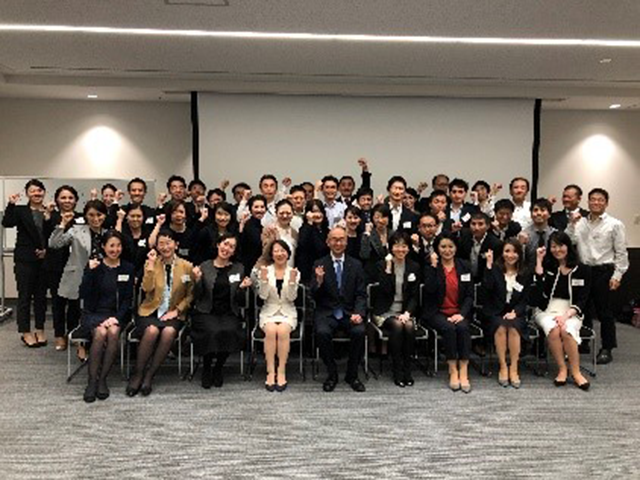
The JAL Group Next Leaders’ Training
"The JAL Group Next Leaders' Training" is held annually for management candidates selected from JAL Group companies (operations, cargo, passenger sales, reservations, maintenance, ground handling and other areas). Expected to be future managers of the JAL Group, they learn about management strategy of the JAL Group, marketing, finance, accounting, and analysis methods such as 3C (customers, competitors, company) , PEST (political, economic, social and technological).
In addition, our staff in Silicon Valley gave a new lecture on the theory and practice of "New Value Creation”. Based on these learnings, seven teams, consisting of six people each, spent approximately six months formulating a business transformation plan that will lead to an increase in the JAL Group's corporate value and business profits. A presentation was then held to wrap up the training. This training was held twice a year, with a total of 86 participants.
- The themes of the 14 team's business reform proposals during this training included "aircraft recycling business", "revitalization of local regions through increased use of JAL flights" and "businesses related to global environment preservation”.
- The income and expenditure effects are expected to be approximately 19.8 billion yen over the next five years,and are expected to bring significant benefits.
- As an effect of holding this training annually, employee satisfaction in the area of human capital development in the 40s has maintained high scores: FY19 survey: 3.54 (max 5.0), FY21 survey: 3.65 (max 5.0), FY23 survey: 3.60 (max 5.0).
- Participants in this training are 0.24% of all employees.
- The proportion of 86 participants selected from the 5,000 main target age groups for this training is 1.72%.
DX Human Resources Development
We conduct basic DX education for our 36,000 Group employees in order to build services and business models that meet the needs of customers and society through the use of digital technology as well as to develop DX human resources that create new value by transforming old internal processes and organizational culture. In addition, we provide DX education tailored to each level, including management and business staff.
Training Period and Cost per Person
The JAL Group has a variety of initiatives to motivate its employees.
Performance Appraisal
We encourage each employee to look back on the process and results they achieved in the past year toward their own objectives, and use this as an opportunity for self-development. In addition, we conduct performance appraisal with the aim of providing guidance to subordinates and developing human resources such as skill development.
Specifically, we conduct performance appraisal using PFO (Performance for Objectives), in which the results of individual objectives and the actions taken to achieve them are linked to the "key elements of human resources expected by the company".
Individual objectives are set at the beginning of the fiscal year based on the objectives of the organization to which the employee belongs, through dialogue with their boss. After half a year, an interim review will be conducted with the boss to review the progress of individual objectives. At the end of the fiscal year, a "Human Resources Review Meeting" is held to conduct a multidimensional peformance appraisal by multiple departments. After that, each employee will confirm the process (practice status) and results of objectives achievement together with the boss, and share the strengths and learning points with the boss. Strengths and learning points are indicated in line with the "key elements of human resources expected by the company" used in the performance appraisal. Education and training menus are prepared according to each element, and employees can choose the menu after receiving the strengths and learning points.
By having agile conversations with their boss, receiving follow-up on goals and feedback on results, the company leads the performance appraisal to employee development. And finally, leads the performance appraisal to the goals of the teams which each employee belongs.
The company also introduces 360-degree feedback to manegement level from fiscal year 2023.

